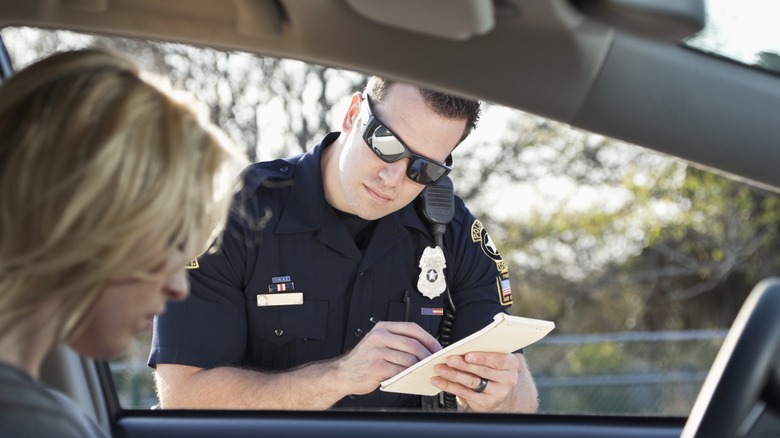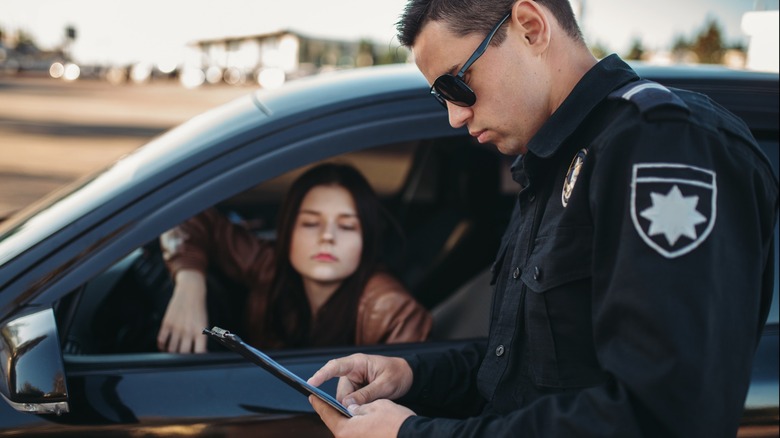What Happens If You Get An Out-Of-State Traffic Ticket?
Unexpected things happen when you're driving. But no matter what happens on the road, you're probably never going to get hit with a million-dollar traffic ticket. That said, don't make the mistake of thinking you can get away with avoiding an out-of-state traffic ticket. It can still affect your driving record, and this is largely because of interstate agreements like the Driver's License Compact (DLC) and the Nonresident Violator Compact (NVC), which allow states to share information about traffic violations.
As a result, the offense will be reported to your home state's motor vehicle department, and any points or penalties associated with the ticket may be added to your driving record just as if the violation occurred in the state in which your car is registered. If you fail to resolve the out-of-state ticket, you're only making matters worse because your home state may suspend your license until the matter is taken care of. You may also be required to pay extra fees to reinstate your license. Keep in mind that nearly all states participate in the DLC and NVC, so you're still responsible for the ticket no matter where you received it.
What are your options if you get an out-of-state traffic ticket?
When it comes to handling a traffic ticket, you have a few options. The first option is to simply pay the fine. Many states make this process fairly easy, so you can pay online, by mail, or over the phone. However, paying the fine can be considered an admission of guilt, which means you could still end up with points on your driving record, and that could potentially drive up your insurance premium.
If you believe that the ticket was issued unfairly, you can choose to fight it in court. This may require you to appear in the state where the violation occurred, which may be inconvenient, especially if the location isn't close to home. In some cases, you can hire a local attorney to represent you, and that could save you the stress of having to travel. If all goes well, they may be able to get the court to reduce the penalty, lower fines, or even dismiss the ticket altogether.
Another option in some states is to attend traffic school. If you go down this route, you'll pretty much avoid having the ticket affect your driving record, and that could also help you prevent any issues with your insurance rates going up. Ultimately, you have to check with the state where you got the ticket to see if this option is available. If the state does offer this option, it doesn't necessarily mean you have to return to that state to complete the traffic school program — you may be able to complete the courses online.
What happens if you ignore the ticket?
Ignoring an out-of-state ticket is not worth the hassle. First, if you fail to pay the fine or contest the ticket within a reasonable timeline, your home state could suspend or revoke your driver's license. While you're not addressing the ticket, additional fines and late fees will rack up, making the situation even more expensive. In extreme cases, an unresolved ticket could even result in a warrant for your arrest, especially for serious violations like speeding or reckless driving.
Now, that's not all. Ignoring a ticket can also affect your driving record and insurance. An unresolved ticket complicates things when you need to renew your registration or license and racks up points on your driving record. Since insurance companies occasionally evaluate your driving record, an unpaid ticket could really impact your insurance policy. So, it's important to address an out-of-state traffic ticket as soon as possible.
Of course, the best way to avoid getting a ticket in the first place is to be safe and attentive on the road. While some apps can help you avoid a speeding ticket, ultimately, following posted speed limits, signaling when changing lanes, and avoiding distractions are the way to go. It also couldn't hurt to make yourself aware of local speed limits and driving laws, as these can vary from state to state, before driving in an unfamiliar area.


